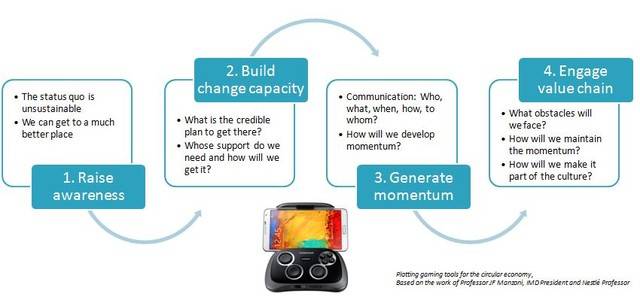Finch & Beak is now SLR Consulting, a global organization that supports its clients on setting sustainability strategies and seeing them through to implementation.
We invite you to check out the SLR website, so you can see the full potential of what we offer, from sustainability strategies to implementation covering Climate Resilience & Net Zero, Natural Capital & Biodiversity, Social & Community Impact, Responsible Sourcing and more.
To accelerate teams, gaming has (re-)emerged as a helpful tool for change. As companies are increasingly applying business design thinking, methodologies such as LEGO® SERIOUS PLAY® gain more followers. Each business environment is different on topics such as culture, motivation and momentum and there are plenty of games around to consider. But of course not all are equally suited for the task. So what types of games can be distinguished in the various stages of change?

1. Raising Awareness Amongst Stakeholders
In the early stages of a transition, stakeholders need to be convinced of the need for change and the availability of a better alternative. In this stage, internal gaming competitions are often used to collect ideas and best practices and to provide insights in the business potential. For instance, at the initial stages of the Sustainable Living Plan, Unilever ran an awareness program called USLP in Action to increase employee involvement and to raise awareness and knowledge.
2. Building Change Capacity
To make the change happen, a plan needs to be formulated. Teams think about what needs to be done, who is the right person to support this and how to get this support. Global media company, Liberty Global used Change Pro© to combine simulation gaming with concrete action planning of their sustainability program. Change Pro© is a simulation game that challenges groups of participants to effectively implement a sustainability transformation program.
After debriefing, teams typically work on their action planning in areas such as SDG integration, implementation of the new sustainability strategy and the implementation of circular economy initiatives. Over the years, Change Pro© has been successfully used by organisations such as IMD, Harvard Business School, BASF, Novartis and Nestlé.
3. Generate Momentum
Frontrunners typically apply their early successes to generate momentum. For instance DSM’s clean cow project, which was aimed at developing a food additive for cows to reduce their GHG emissions, allowed the company to generate additional internal momentum for its sustainability program. Understandably gaming in this stage is primarily used to spur on innovation and change. A great example is Green&Great. In this simulation game players find themselves in the role of managers in large consulting firms. Their companies compete for clients and seek to make a profit, while achieving social goals and reducing environmental impacts. By facing the consequences of their own decisions, players learn and experience the importance of business sustainability as a source of competitive advantage. The contents of the game can be customized to match specific situations and training needs.
4. Engaging the Value Chain
One of several industries where a large array of innovations are shaking up the existing business is the energy sector. New technologies, business models and regulations are creating the need for change. The mechanisms embedded into the ENERGY TRANSITION GAME mimic these changes decision makers face in the process of energy transformation from fossil fuels to renewable energy sources. Each player takes a different role within a complex energy system landscape. Each role has different responsibilities and decisions to make: energy producers, grid operators, technology start-ups and ministry of energy. After the game a debriefing helps participants transition from game simulation into real life application. A great game for multi stakeholder participation with collaboration partners, not only for the energy sector.
Finch & Beak helps organizations accelerate on sustainability for instance by involving employees better in the corporate sustainability program and associated goals. Furthermore, Finch & Beak can facilitate games such as the Energy Transition Game, of which a information leaflet can be found in the attached download. If you want to learn more, contact us at hello@finchandbeak.com for more information.
Finch & Beak
hello@finchandbeak.com
+34 627 788 170